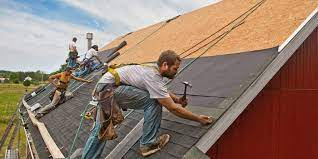Introduction
Does homeowners insurance cover roof replacement? Standard homeowner insurance policies adequately cover roofs and roofing projects. If your roof is damaged by bad weather or an accident, your insurance policy may cover the cost of repairs or replacements. As a result, the damage is covered by standard homeowner's insurance. However, if the insurance company discovers that your roof has been damaged due to a lack of maintenance or wear and tear, they will likely refuse to pay for repairs or replacements.
Roofs older than 20 years are also exempt from coverage. Older. The current cash value of an older roof is typically used when insuring it. In other words, you won't get paid for your roof until 20 years of depreciation have been factored in. In the event of damage to your roof, your standard all-risks homeowner's insurance policy will pay for the cost of a replacement. The good news is this. Damage or destruction caused by an unexpected accident or natural event can only be used in most cases. As part of the homeowner's general upkeep, problems arising from normal wear and tear or from the roof lasting longer than expected are not eligible for reimbursement.

Ways Homeowners Insurance Helps Protect Your Roof
- Your insurance company may reject your claim for a roof replacement if you don't follow the proper steps when filing a claim and they don't follow the proper steps themselves. Because of this, understanding how to locate home insurance that will cover the cost of a new roof is critical.
- You should check your homeowner's insurance policy to see if it covers damage to the roof. Without paying attention to the policy, it could take a while. Your financial decisions about roof repairs will be guided by the information you receive. Your insurance provider should be able to provide you with a copy of your policy.
- Repair and replacement coverage are the most common types of roofing insurance offered by most insurance companies. Repair coverage typically pays a portion of the repair bill for the homeowner.
- The repair of a roof that is beyond repair is covered under the replacement coverage. The policies are more expensive, and accepting a claim is more challenging. This is why documenting damage and filing claims as soon as possible are essential.
- Unfortunately, homeowners insurance does not cover all types of roofing damage. The specific policy you have, your home's location, and the damage caused affect your coverage. For example, if a hail storm damages a roof, it may be covered because it is unusual and impossible to anticipate.
What to Look for in a Roof Insurance Policy?
To determine whether or not your roof insurance is adequate, you should ask the following three questions. It all starts with the risks covered, moves on to how you will be compensated, and concludes with how much money you will receive as a result of an insurance claim:
- Does your home's roof come with any insurance, such as "all risks" or "open perils"? The use of Named Perils imposes limits.
- A Replacement Cost Protection policy should cover your home, including its roof. If this is the case, will the actual cash value (ACV) be used as the basis for settling claims?
- In the event of a significant loss, can the deductible be waived, and what is the total amount of the building's insurance policy (including the roof's coverage)?
Limits on Roof Insurance
Standard limits for claiming damages are included in all home insurance policies. Your home's insurance company may limit the coverage you are eligible for in a risky event like water damage on your roof. Reduce the money you'll have to spend on roof damage—prior insurance claims or living in an area considered high-risk for insurance. Exclusions for hurricanes, windstorms, tornadoes, and hail may affect your roof or storm damage insurance coverage, so consider putting in exclusions for these types of damage. Minor claims require a higher deductible.

Conclusion
According to a recent study, many homeowners believe their insurance company will cover roof damage from everyday use and wear and tear. Cleaning the gutters and having your roof inspected regularly will help you catch any leaks or pools of water before they become a significant problem. Larger—and potentially dangerous—issues may arise if the problem is not addressed. Because you are responsible for upkeep of your home, insurance policies do not cover damage resulting from neglect. Insurance will not pay for roof repairs or replacements because of wear and tear or because the roof's life span has expired. In an emergency, a lack of maintenance can have a negative impact.



